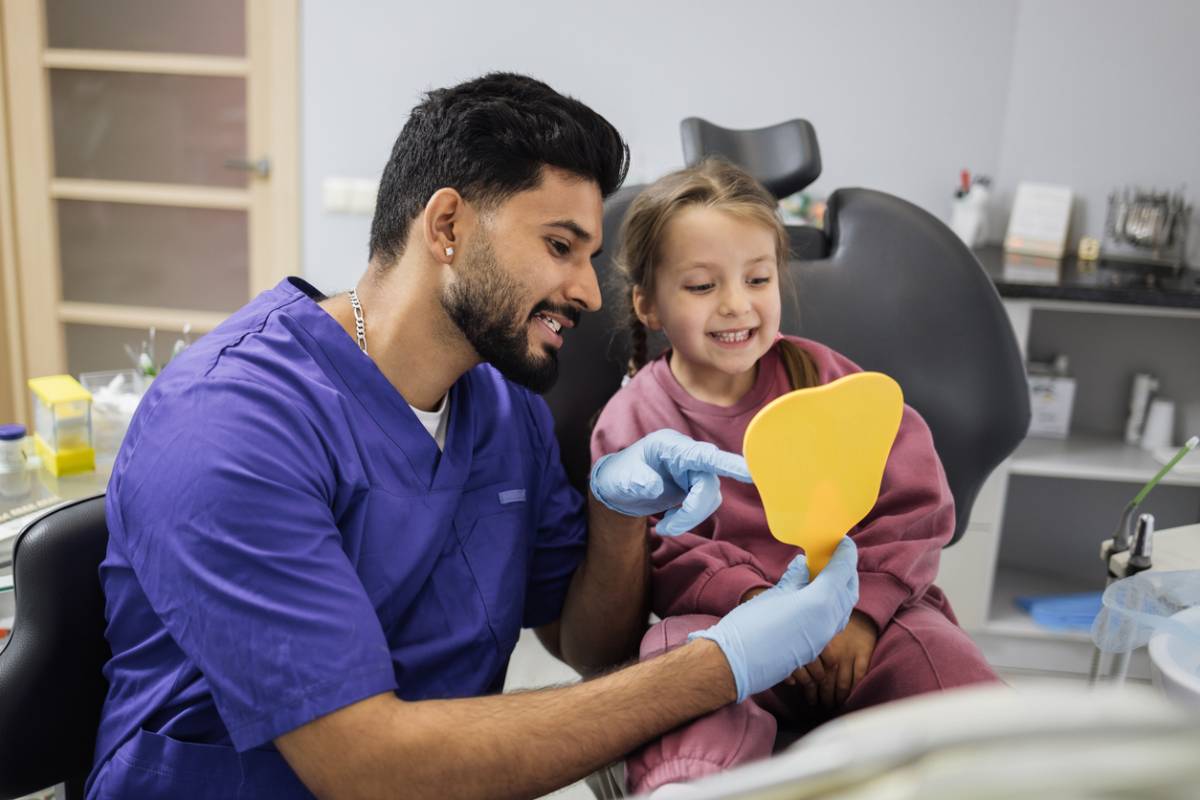Pediatric dentistry is a big part of proper health care for a child, as oral health can have an impact on the health of the whole body and the development of a child. But what age do pediatric dentists treat? In this article, we discuss the answer to this question and the benefits of pediatric dental visits.
What Age Do Pediatric Dentists Treat?
Pediatric dentists treat children from 6 months to 18 years of age. Typically, it is recommended to have the first visit to a pediatric dentist as soon as the first tooth begins to erupt or within the first 12 months of a baby’s life. Starting your visits to a pediatric dentist this early on will help monitor the development of your baby’s jaw and teeth, anticipate any potential orthodontic issues, and thus plan future treatments correctly.
Childhood is a time of constant growth and development, and changes can happen unexpectedly. Thus, regular dental checkups are a must for your child’s overall and oral health. The general rule about the frequency of pediatric dental visits is the same as for dental visits for adults: you should sign up your child for checkups, professional cleanings, and fluoride treatments twice a year to prevent oral infections, cavities, and gum disease. On top of that, regularly visiting a pediatric dentist will teach your child good self-care habits for life. Also, your doctor will help your child develop effective at-home oral hygiene practices.
The Importance of Regular Pediatric Dental Checkups
It is a common misconception that temporary baby teeth do not need to be professionally cleaned or treated if they get cavities, as they are going to fall out anyway. However, nothing can be further from the truth. Dental care is just as crucial for baby teeth as for permanent ones. Below, we talk about the main reasons to have your child visit a pediatric dentist every 6 months.
Cavities and Early Tooth Loss Can Lead to Malnutrition
As we all know, cavities and tooth decay lead to pain and soreness in the mouth. As a result, a child might refuse to eat foods that require a lot of chewing, as it causes additional pain. Untreated decay often leads to precocious loss of baby teeth, which also makes chewing food more challenging.
Typically, foods that children with dental issues refuse to eat include meat, vegetables, fruits, and nuts, which are filled with protein, vitamins, fiber, and minerals crucial for the proper development of a child.
Additionally, children who can not chew food properly due to a toothache or the absence of teeth risk developing issues with the digestive system.
Poor Dental Health Can Cause Chronic Stress
Children with untreated dental health issues, such as tooth decay and gum disease, are likely to experience chronic pain and discomfort that lead to constant stress and anxiety. In consequence, the child can develop behavior and learning issues and become moody and reluctant to socialize. On top of that, chronic stress often negatively affects a child’s general health.
Toothache and Precocious Tooth Loss Can Cause Speech Issues
Developing proper pronunciation habits relies on having a complete set of healthy baby teeth. Children who experience chronic toothache or precocious baby tooth loss can develop various speech issues, such as a lisp.
Poor Oral Health and Insufficient Care Can Lead to Chronic Gum Disease
Gum disease, also known as periodontal disease, is a chronic infection of the gum tissue. The leading causes of gum disease are an insufficient oral hygiene routine and untreated oral issues. This condition can lead to the following problems:
- Bleeding and swollen gums
- Chronic bad breath and an unpleasant taste in the mouth
- Tooth loss of the baby and permanent teeth
- Deterioration of the jaw bone structure and issues with facial development as a result
- Chronic oral health issues in adulthood
Poor Oral Health Can Lead to General Health Issues
Chronic bacterial infections in the mouth are closely associated with general health issues, such as problems with the heart, lungs, joints, and gastrointestinal system, and exacerbation of such conditions as diabetes.
Early Baby Tooth Loss Can Result in Orthodontic Issues
Precocious baby tooth loss negatively affects jaw development. As a result, orthodontic issues with permanent teeth, such as misaligned bites and crowded teeth, are likely to occur.
Visit a Pediatric Dentist at The Smile Artists LA
Sign up your child for an appointment with a friendly and experienced pediatric dentist at The Smile Artists LA dental office. We look forward to helping your child grow strong and healthy.





 )